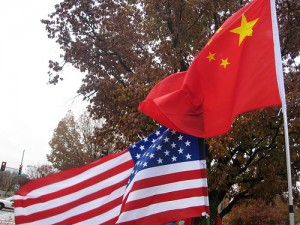China’s been grabbing up resources as fast as they can with all their export earnings:
Since becoming a net oil importer in 1993, China has rapidly overtaken everyone but the US in its thirst for the world’s crude. If one could quantify a country’s eagerness to control this vital resource, though, China would surely be number one. Aggressive investments in Africa’s resource sector have led some to dub its policies there the “Great Chinese Takeout”. Its latest move, a $20bn loans-for-oil deal with Venezuela, coming on top of an existing $8bn commitment, is its largest. This follows last year’s $25bn loans-for-oil deal with Russia and separate agreements for $10bn each with Brazil and Kazakhstan.
On face value, China’s energy grab appears naive. Extending below market rate loans and investing in areas like Venezuela’s Orinoco Belt, recently eschewed by many multinationals, mean that it may earn a low risk-weighted return. Even if these projects are ultimately successful, procuring actual barrels halfway around the globe is inefficient and unnecessary. Oil is a fungible commodity so buying a distant barrel simply frees up a nearer one for someone else. Financially speaking, China is in effect entering massive, long-dated commodities futures contracts.
Ok, oil is only partially fungible even now. Oil has to be refined, and refineries are built to handle specific types oil. Asphalt-quality oil from the Canadian tar sands, which powers much of the western US, for example, simply cannot be refined in refineries not set up for it.
More to the point, if there are absolute shortages of oil which can be refined by the current crop of refineries coming up, and there are, and if it takes years to build new refineries, and if cheap oil is or has come to and end (if it hasn’t, which depends on your definition, it is going to, and soon) then oil is not fungible.
Any country which does not have enough domestic supply of oil for its own needs should definitely be locking in oil supplies. Because there just isn’t going to be enough of it, and soon.
China has done relatively well these past 30 odd years because they tend to think ahead. Oh, they say, we’re near peak oil, we should lock in supplies. Oh, they say, we don’t need a big army, we should put that money into the economy so that if or when we do need a big army our economy can afford one. Oh, we’ve got a population problem, we should cut back on population growth. Oh, we’re choking on smog, we should invest in green technology in such a way that in 10 to 20 years we’ll probably be the biggest producers.
That’s not to say they’re forward thinking on everything (for example, they aren’t handling water well at all, or desertification) but compared to most other countries, they’re cracker jack.
And folks like the FT’s Lex team are living, not just in the present, but in the past. Maybe it’s time that the West’s “intellectual” class started staring the future, or even the present, in the eyes?

